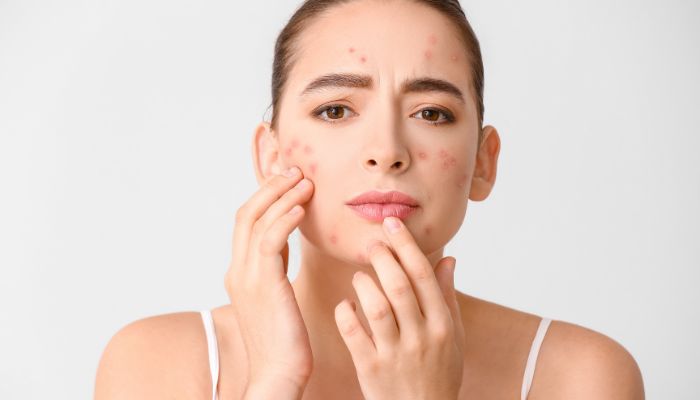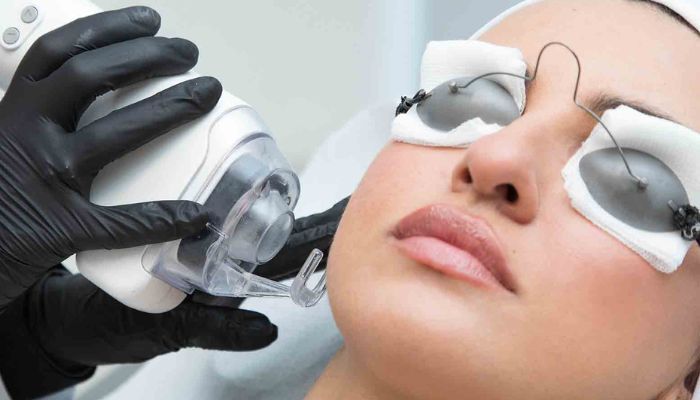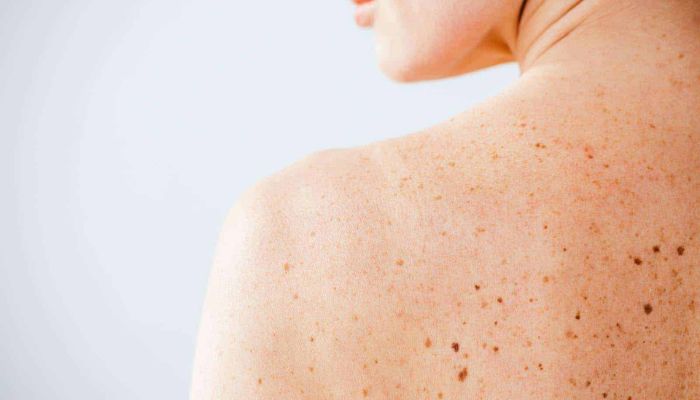Whether you’re a regular at the dermatologist’s office or seeking a first treatment, if you’re pregnant or nursing, you might want to hold off.
Many women experience changes to their skin during pregnancy and breastfeeding. These changes can include hyperpigmentation, acne, growths, and varicose veins. Frequently, these changes will send women to seek treatments from a skincare specialist.
We, dermatologists, take special precautions to consider the welfare of both the patient and the baby during pregnancy. While some procedures are perfectly safe, others should be put off until after delivery.
So what’s safe for expectant mothers, and what should be avoided? Keep reading to learn more about some of the frequently asked skincare questions we receive from pregnant and nursing women.
Table of Contents
How Should I Treat Pregnancy Acne?
As a result of the hormonal changes associated with pregnancy, up to 45% of pregnant women experience increased levels of acne. Occasionally, it may be the first time you experience acne to such a degree. But if a breakout has you headed towards the pharmacy in search of over-the-counter acne treatment, you might want to visit your dermatologist first.
Surprisingly, many over-the-counter acne products contain ingredients that are considered “Category C” in pregnancy, which means that research has not yet determined whether they are safe for pregnant women to use. These ingredients include salicylic acid and benzoyl peroxide, both of which are incredibly common in everyday acne treatments.
Thus, if you’re experiencing pregnancy acne, it’s best to see a dermatologist for recommendations on which acne products are safe for you to use. Your dermatologist may suggest one of the following treatments for pregnancy acne:
– Topical chemical exfoliants like glycolic or azelaic acids
– Regular facials and extractions performed by a dermatologist
As your hormones change throughout your pregnancy and after giving birth, your skin will continue to change. Your doctor can help you to design a skincare routine that’s effective yet safe.

What Skincare Ingredients Should I Avoid During Pregnancy?
There are several other product ingredients that should be completely avoided during pregnancy and nursing and even while trying to conceive. Many people don’t realize this, but any ingredients you apply to your skin can seep into your bloodstream and interact with your baby’s development.
Vitamin A derivatives are a commonly cautioned-against ingredient since they have been associated with defects. Popular skin products formulated with vitamin A derivatives include Retin-A, Tazorac, Renova, and Accutane. We also recommend avoiding tetracycline, minocycline, and doxycycline, as these may cause permanent skin and teeth discoloration.
Can I Get Botox and Fillers While Pregnant or Breastfeeding?
One question that frequently comes up is whether fillers and Botox-like products such as Dysport and Xeomin are safe to use while pregnant or breastfeeding. The safety of fillers and other injectables on pregnant or breastfeeding women has not been established. Thus, they are generally not recommended.
That said, hyaluronic filler products like Restylane, Juvederm, or Belotero are technically safe as they are simply sugar-based compounds. However, in general, we recommend that new and expectant mothers hold off on all cosmetic procedures until after delivery or breastfeeding has ceased. If you have your heart set on these procedures, we recommend that you consult with your obstetrician first. In our opinion, since we don’t know whether they are 100% safe, it’s better to err on the side of caution.
Can You Have Other Dermatology Treatments While Pregnant or Breastfeeding?
Similarly, microdermabrasion, chemical peels, and laser, ultrasound, and radiofrequency-type facial procedures should also be avoided while you’re pregnant or breastfeeding.
While there’s no strong evidence to suggest that these procedures are harmful to either mother or baby, these procedures can have adverse effects on the skin. During pregnancy, women are more likely to develop post-inflammatory hyperpigmentation and keloid scarring. Thus, dermatologists cannot promise that these treatments will have the same positive results for pregnant women as they might before or after pregnancy.
Due to the lack of studies, we recommend scheduling any elective dermatological treatments until post-pregnancy. After all, it’s better to be safe than sorry, and you and the baby are more important than any cosmetic treatment. We also recommend consulting with your dermatologist to develop a safe skincare routine, especially if you’re experiencing pregnancy acne. When in doubt, ask your obstetrician for their advice.

Safe and Effective Natural Remedies for Managing Acne During Pregnancy
The good news is that there are safe and effective natural remedies you can use to manage acne during this special time.
One popular natural remedy is apple cider vinegar, known for its antibacterial properties. Dilute it with water and apply it to affected areas using a cotton pad to help reduce inflammation and balance the skin’s pH levels. Baking soda, mixed with water, can also be used as a gentle exfoliant to unclog pores and reduce acne.
Citrus fruits, such as lemons and oranges, contain natural acids that can help remove dead skin cells and reduce the appearance of acne scars. Simply apply freshly squeezed juice to your skin and rinse it off after a few minutes.
Coconut oil, with its antimicrobial properties, can be used as a moisturizer to soothe and hydrate the skin. Opt for unrefined, organic coconut oil for the best results.
Another fantastic natural remedy is honey, particularly Manuka honey, which is recommended for its antibacterial and healing properties. Apply a thin layer of honey to your skin and leave it on for about 15 minutes before rinsing.
Oatmeal, when mixed with water and applied as a paste, can act as a gentle cleanser and exfoliant, helping to remove excess oil and dead skin cells. Cucumber slices can also be placed on the affected areas to reduce inflammation and redness.
Yogurt, with its probiotics, can help balance the skin’s microbiome and reduce acne. Apply a thin layer of plain yogurt to your face, leave it on for 10-15 minutes, and then rinse it off.
It’s important to remember that everyone’s skin is different, so it’s crucial to perform a patch test on a small area of skin before trying any new remedy to check for any potential allergic reactions.
In addition to natural remedies, following dermatologist-recommended skincare tips is essential for managing acne during pregnancy. Be gentle with your skin, cleanse it twice a day with a mild cleanser, and avoid using harsh or abrasive products. Moisturize regularly, wear sunscreen to protect your skin from harmful UV rays, and avoid picking or squeezing acne, as it can lead to scarring.
Conclusion
Pregnancy acne can be a frustrating and challenging experience for many women. However, it’s important to remember that you’re not alone and that there are ways to manage and minimize these skin changes while pregnant or nursing.
Throughout this blog, we’ve explored various natural remedies and dermatologist-recommended skincare tips that can help you effectively manage pregnancy acne. From apple cider vinegar and baking soda to citrus fruits, coconut oil, honey, oatmeal, cucumber, and yogurt, there are plenty of safe and natural options to explore.
Remember to always perform a patch test before trying any new remedies and consult with your healthcare provider or dermatologist to ensure their suitability for your specific situation.
In addition to natural remedies, maintaining a gentle skincare routine, cleansing your skin properly, moisturizing regularly, wearing sunscreen, and avoiding harsh products are crucial steps in managing acne during pregnancy.
While it can be tempting to feel self-conscious about pregnancy acne, it’s important to embrace the changes happening to your skin and focus on the beautiful journey of motherhood. Taking care of your overall health, staying hydrated, eating a balanced diet, and managing stress levels can also contribute to healthier skin.



